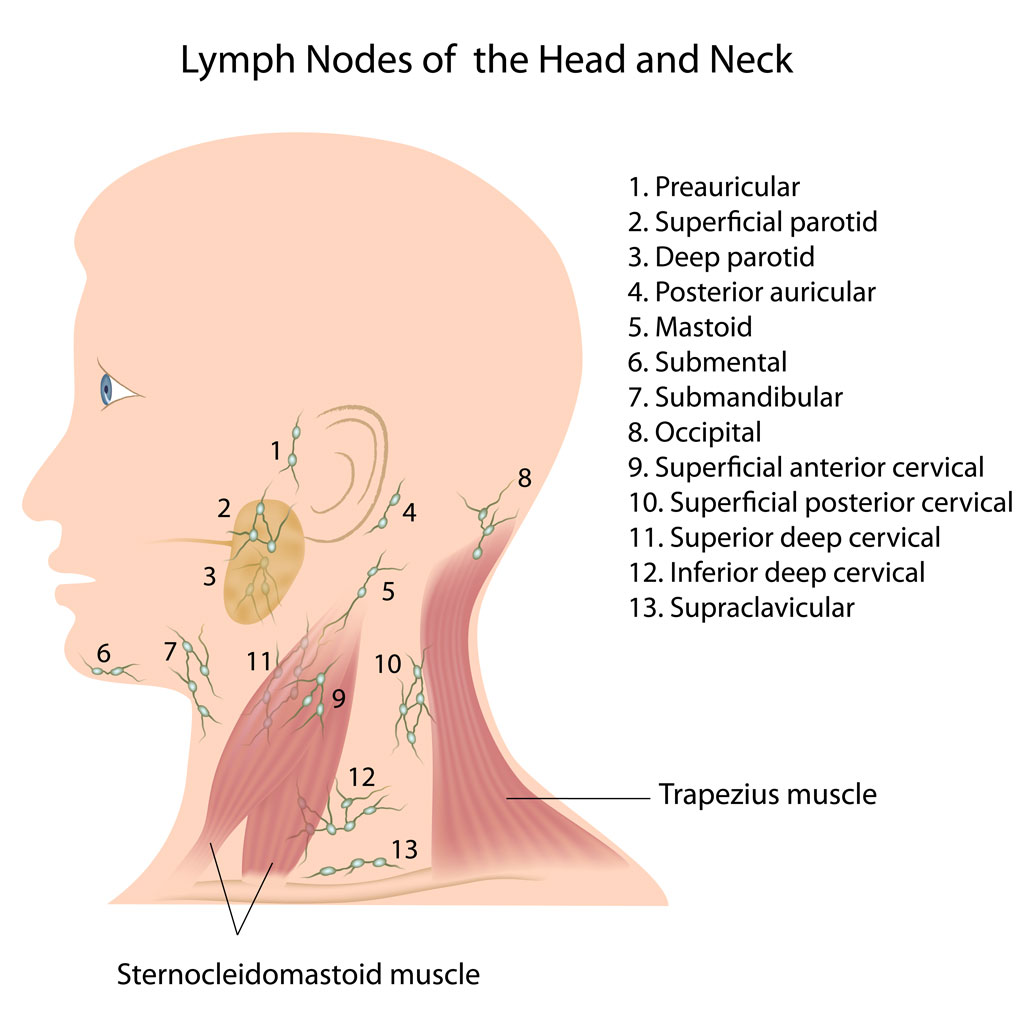Neck dissection is a ENT surgical procedure to remove some or all of the lymph nodes located in the neck, and sometimes additional tissue surrounding the lymph nodes. Neck dissections are typically performed on patients with head or neck cancer. Because cancer can spread to the lymphatic system and about 200 of the approximate 600 lymph nodes of the body are located in the neck, a neck dissection is utilized to remove any suspicious lymph nodes and determine if the cancer has spread.
How is Neck Dissection Performed?
Neck dissection is performed through an incision in the neck that typically begins below the ear within a skin crease and courses down across to the middle of the neck. Many important anatomical structures pass through the neck, and your surgeon will carefully identify and preserve these whenever it is surgically possible. Some tumors involve other neck tissue such as nerves, blood vessels, or muscles, making it necessary for them to be removed during the neck dissection.
Anatomical structures which are most commonly involved in neck dissection include:
- Internal jugular vein: Major blood vessel which returns blood from the head to the heart
- Spinal accessory nerve: Controls much of the major shoulder muscle movement
- Sternocleidomastoid muscle: Large cervical muscle which primarily allows neck flexion and head rotation
Types of Neck Dissection
Neck dissection classification is dependent upon which zones of the neck the lymph nodes are removed from and whether the neck structures are able to be preserved.
Neck dissection classifications include:
- Radical neck dissection: During this dissection, all or nearly all of the lymph nodes from the collarbone to the jaw bone (zones I through V) are removed, as well as the internal jugular vein, the spinal accessory nerve, and the sternocleidomastoid muscle. Radical neck dissection is typically performed if a neck tumor has spread extensively.
- Modified radical neck dissection: This procedure involves removal of most of the lymph nodes between the collarbone and jaw bone on one side of the neck and removal of at least one of the 3 neck structures (internal jugular vein, accessory nerve, and sternocleidomastoid muscle) is left intact.
- Selective neck dissection: Only selected lymph nodes (usually those closest to the tumor) are removed from the neck.
Side effects will vary depending on how extensive the neck dissection must be. Removing one jugular vein or one sternocleidomastoid muscle can have minimal side effects, while spinal accessory nerve removal will likely limit shoulder movement. In some cases, the neck may appear thinner or sunken on the operative side post-surgery.
It is not uncommon to experience temporary neck swelling as well as some numbness of the neck or ear after neck dissection. While much of the numbness tend to subside over time, it is possible that some numbness may be permanent, especially if the nerve which supplies sensation to the ear needs to be cut during surgery. The lower lip and shoulder may feel weak for several months and, as with numbness, some feeling of weakness can be permanent.
Neck Dissection Recovery
Most neck dissection patients are hospitalized for a few days. In some cases, the patient will be discharged once the drain from the neck is removed, or the drain may be left in and removed at a later date along with the sutures. Pain and stiffness in the neck is normal after surgery, and your ENT surgeon will prescribe pain medication to alleviate discomfort.
You will be given detailed instructions on incision care, diet, and activity restrictions. Follow your surgeon’s instructions carefully to assist in a faster recovery. Physical therapy/exercises will be an integral part of your surgery’s success, however be sure to rest when you become tired, as not to overexert yourself.
Contact your doctor immediately if:
- You develop a fever
- Pus is draining from your incision
- Red streaks appear from your incision
- Redness, pain, swelling, or warmth increases at the surgical site
- You experience excessive bleeding through your bandages
- Your incision opens or your stitches become loose

If you would like an appointment with one of our physicians at Fort Worth ENT & Sinus please complete an online appointment request or phone 817-332-8848.


